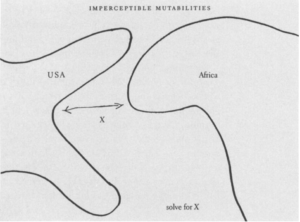After reading Tayler’s post about Suzan-Lori Parks play, Imperceptible Mutabilities in the Third Kingdom, it made me think more about the way in which we learn about slavery and observe the continent of Africa. I feel as though the idea of an audience viewing a theater performance and feeling uncomfortable when being called out, strongly relates to the way Americans view Africa. Within Park’s play, the characters only view Africa through the tv from the show “Wild Kingdom,” pointing out the way that Africa is stereotypically viewed as a “wild” place. In our group discussion in class, we looked back to the beginning pages of The America Play and Other Works, we saw this diagram labeled Imperceptible Mutabilities:

This immediately took me back to what I learned when studying abroad in Senegal and was happy to see this similar theme come up in Park’s work. There is constant observation between the United States and Africa, yet people often forget the impact of the middle, the Atlantic Ocean. The Atlantic was the great route of transportation that started slavery and intensified racism. Park’s satire by stating “solve for x” enlightens the fact that many people do not consider the way the Atlantic impacted African lives forever by leading many to slavery. Yet, ironically, the Atlantic is what connects the United States and Africa together, making them closer than many people consider.
Many individuals in America view Africa as if it is not even in the same world as the United States, looking at it as something ‘less than’ or something they ‘pity.’ This furthers the concept of the ‘single story’ of Africa, as people only choose to see the bad parts instead of the good. When I was abroad in Dakar, Senegal, Dr. Kodjo Adabra taught us a powerful lesson about the way Americans choose to view Africa. Adabra held up a blank sheet of paper to the class and asked, “What is this?” We naturally replied that it was, “just a blank sheet of paper.” Adabra put the paper down, drew a small black dot in the center of the paper, held the paper back up to us and again asked, “What is this?” Now we replied saying, “it’s a black dot.” Adabra explained that this was exactly the issue with the way people observe things. We choose to focus on one small aspect instead of the big picture. He said that this was still the same sheet of paper with lots of blank space still available, but we chose to focus on the black dot. This is the way that many people view Africa and create a single story about the continent based on the small amount of bad without even recognizing the immense amount of good. Much of the reason why we may view Africa as ‘less than’ stems from the slavery that all started on the journey along the Atlantic, again forcing us to truly “solve for x.”
Plays that we’ve looked at in class such as Imperceptible Mutabilities in the Third Kingdom and A Raisin in the Sun, show an essential theme that many white Americans may not necessarily think about or understand. The slave trade across the Atlantic had the power of separating people from their culture and homeland, leading them to no longer be able to find a sense of identity. In Senegal, I learned that many Africans sold other Africans that were viewed as social outcasts. This lead to them not only being ostracized in America when being forced into slavery but also being ostracized in their own country of Africa. Saidiya Hartman’s book, Lose Your Mother, explains this concept in great detail as it chronicles her journey along the Atlantic slave route back to Ghana, trying to find a piece of herself through her African heritage. She then finds that this is truly impossible as African Americans have truly been outcasted from Africa. Hartman struggles as she tries to find her identity as she feels like an outcast in America due to her being a Black woman, yet also feels like an outcast in Ghana as she is unable to feel welcome there. The plays we’ve read in class also touch on the topic of having a lack of belonging due to the inability to track one’s roots and a complete culture change. Therefore, “solving for x” could literally be the thing that so many people that stem from enslaved individuals try to do when they want to find their heritage or sense of belonging. The Atlantic serves as a great divide that has swallowed up a history and served as a route to enslavement.
